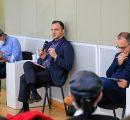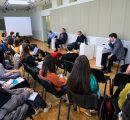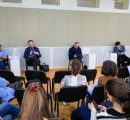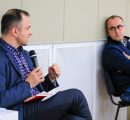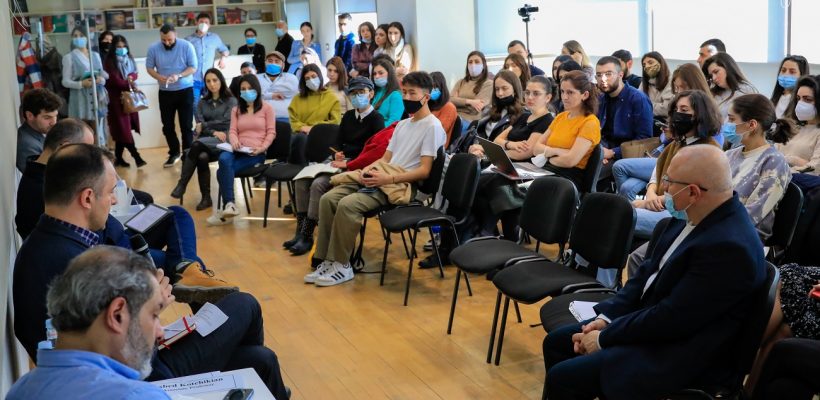
PSIA Holds Discussion on Ukraine, Russia, and Beyond
3 min readYEREVAN, Armenia — On February 24, 2022, the faculty of the American University of Armenia (AUA) Political Science and International Affairs (PSIA) graduate program held a discussion on “Ukraine, Russia, and Beyond: Decoding the Escalation.” Among the panelists were Associate Professor and Program Chair Vahram Ter-Matevosyan, Adjunct Lecturer Hovhannes Nikoghosyan, and Adjunct Lecturer at the College of Humanities and Social Sciences (CHSS) Pietro Shakarian. Associate Professor Asbed Kotchikian moderated the event and shared his own viewpoint on the topic.
Dr. Ter-Matevosyan kicked off the discussion by highlighting the idea that the collapse of the Soviet Union is not over yet. It is a long and violent process which continues to have a deep impact on the nations of the post-Soviet space. The repercussions of the administrative divisions in Soviet times and multiple territorial disputes have been shaping post-Soviet politics for the last three decades and will continue to do so in the coming years, if not decades. Unsettled reciprocal grievances, emboldened by geopolitical antagonism and rivalry, have set the course of history and politics and affected the social, political, and institutional development of these countries. From this perspective, Ukraine occupies an important place in the post-Soviet geopolitical architecture.
Speaking next, Dr. Shakarian reflected on the dissolution of the Soviet Union, starting with the decision by Boris Yeltsin and the leaders of Ukraine and Belarus to dissolve the union state in the Belovezha Accords in 1991. He then spoke about the pledge by U.S. officials to Soviet President Mikhail Gorbachev not to expand NATO “one inch” past the former East Germany, if Moscow agreed to German reunification. He stressed that, despite the agreement, NATO expanded all the way to Russia’s borders, angering Moscow. He noted that the actions of Russian President Vladimir Putin were in fact a “reaction” to this policy, paving the way for the war in Ukraine. He also touched upon the history of Ukraine and its regional and cultural diversity, as well as the positions of Germany and France, taking into consideration their experiences with war in Europe.
Dr. Nikoghosyan made remarks about the Russian foreign and security policy decision making under President Vladimir Putin. He remarked that the course of the present war was laid since the lines of communication were broken between Ukraine and Russia in 2004. The bigger concern, he posited, is the failure of communication between Russia and the United States, which is uncommon even compared with the Cuban Missile Crisis of 1962 and poses even more uncertain consequences, including for small states like Armenia.
If this conflict is a catalyst for a new, non-rule-based order, which has been brewing since the NATO bombing of Yugoslavia in 1999, then it raises many questions for the Armenian political elite and society about the profile, skills, and capacities of the next Armenian leader. In Dr. Nikoghosyan’s opinion, the likely escalation of competition between Russia and Turkey, on the other hand, will potentially abort the current Armenian-Turkish negotiation process.
The discussion was followed by a Q&A session, during which students and faculty members had the opportunity to expand on the topic and seek further insight into the existing escalation, as well as on how it may impact Armenia and its population.
The Political Science and International Affairs (PSIA) program of the American University of Armenia (AUA) equips students with advanced analytical reasoning, critical thinking, and communication skills through the study of political science and international affairs, emphasizing local and global perspectives and practical applications of theory. The program provides world-class teaching and research, producing graduates who can best contribute to the development of the nation.

